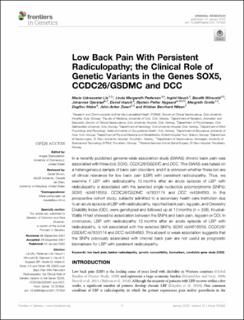| dc.contributor.author | Lie, Marie | |
| dc.contributor.author | Pedersen, Linda Margareth | |
| dc.contributor.author | Heuch, Ingrid | |
| dc.contributor.author | Winsvold, Bendik K S | |
| dc.contributor.author | Gjerstad, Johannes | |
| dc.contributor.author | Hasvik, Eivind Olay | |
| dc.contributor.author | Nygaard, Øystein Petter | |
| dc.contributor.author | Grotle, Margreth | |
| dc.contributor.author | Matre, Dagfinn | |
| dc.contributor.author | Zwart, John Anker Henrik | |
| dc.contributor.author | Nilsen, Kristian Bernhard | |
| dc.coverage.spatial | Norway | en_US |
| dc.date.accessioned | 2022-09-27T07:50:33Z | |
| dc.date.available | 2022-09-27T07:50:33Z | |
| dc.date.created | 2022-02-14T11:58:48Z | |
| dc.date.issued | 2022-01-24 | |
| dc.identifier.citation | Frontiers in Genetics. 2022, 12 . | en_US |
| dc.identifier.issn | 1664-8021 | |
| dc.identifier.uri | https://hdl.handle.net/11250/3021623 | |
| dc.description.abstract | In a recently published genome-wide association study (GWAS) chronic back pain was associated with three loci; SOX5, CCDC26/GSDMC and DCC. This GWAS was based on a heterogeneous sample of back pain disorders, and it is unknown whether these loci are of clinical relevance for low back pain (LBP) with persistent radiculopathy. Thus, we examine if LBP with radiculopathy 12 months after an acute episode of LBP with radiculopathy is associated with the selected single nucleotide polymorphisms (SNPs); SOX5 rs34616559, CCDC26/GSDMC rs7833174 and DCC rs4384683. In this prospective cohort study, subjects admitted to a secondary health care institution due to an acute episode of LBP with radiculopathy, reported back pain, leg pain, and Oswestry Disability Index (ODI), were genotyped and followed up at 12 months (n = 338). Kruskal-Wallis H test showed no association between the SNPs and back pain, leg pain or ODI. In conclusion, LBP with radiculopathy 12 months after an acute episode of LBP with radiculopathy, is not associated with the selected SNPs; SOX5 rs34616559, CCDC26/GSDMC rs7833174 and DCC rs4384683. This absent or weak association suggests that the SNPs previously associated with chronic back pain are not useful as prognostic biomarkers for LBP with persistent radiculopathy. | en_US |
| dc.description.sponsorship | The present study was funded by Oslo University Hospital. | en_US |
| dc.language.iso | eng | en_US |
| dc.publisher | Frontiers Media | en_US |
| dc.relation.ispartofseries | Frontiers in Genetics;January 2022 | Volume 12 | Article 757632 | |
| dc.rights | Navngivelse 4.0 Internasjonal | * |
| dc.rights.uri | http://creativecommons.org/licenses/by/4.0/deed.no | * |
| dc.subject | Low back pain | en_US |
| dc.subject | Lumbar radiculopathy | en_US |
| dc.subject | Genetic susceptibility | en_US |
| dc.subject | Biomarkers | en_US |
| dc.subject | Candidate gene studies | en_US |
| dc.title | Low Back Pain With Persistent Radiculopathy; the Clinical Role of Genetic Variants in the Genes SOX5, CCDC26/GSDMC and DCC | en_US |
| dc.type | Peer reviewed | en_US |
| dc.type | Journal article | en_US |
| dc.description.version | publishedVersion | en_US |
| dc.rights.holder | © 2022 Lie, Pedersen, Heuch, Winsvold, Gjerstad, Hasvik, Nygaard, Grotle, Matre, Zwart and Nilsen | en_US |
| dc.source.articlenumber | 757632 | en_US |
| cristin.ispublished | true | |
| cristin.fulltext | original | |
| cristin.qualitycode | 1 | |
| dc.identifier.doi | https://doi.org/10.3389/fgene.2021.757632 | |
| dc.identifier.cristin | 2001261 | |
| dc.source.journal | Frontiers in Genetics | en_US |
| dc.source.volume | 12 | en_US |
| dc.source.issue | 12 | en_US |
| dc.source.pagenumber | 7 | en_US |

